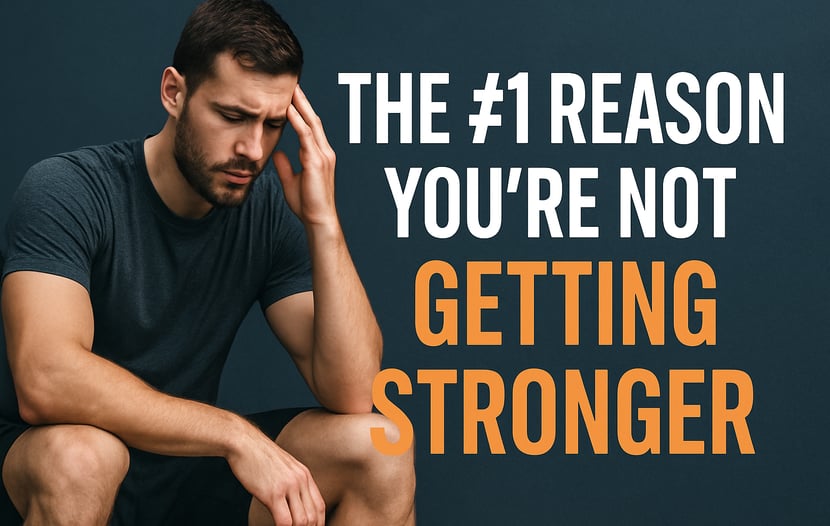The Real Reason You’re Not Getting Stronger (Hint: It’s Not Your Workout)
Training hard but still stuck at the same numbers? It’s not your split — it’s your sleep, nervous system, and recovery habits. This article breaks down why real strength gains come from proper recovery, not just heavier lifts. Learn how sleep, CNS support, and Amazon-approved tools can reboot your progress and finally unlock new gains.
5/28/20253 min read


The #1 Reason You’re Not Getting Stronger (It’s Not What You Think)
You're doing everything right — or so you think. You’re showing up to the gym, eating clean, progressively overloading, and stacking up training days like a machine. But your numbers aren’t moving. The PRs are stuck, the pump’s dull, and your strength gains feel like they’ve hit a wall. Most lifters blame programming or diet tweaks. But the real reason you’re not getting stronger?
You’re under-recovered. Your nervous system is burnt. And your sleep is trash.
And that’s not just some trendy wellness talk — this is grounded in real, performance-backed science. Let’s dig into why your body can’t get stronger until you finally start treating recovery like training.
Why the Nervous System Controls Strength
Your muscles don’t contract by magic — your nervous system activates them. Think of your brain and spine as the power grid, and your muscles as the equipment. If your power grid is overloaded, nothing functions at full capacity.
When you lift heavy, you don’t just fatigue your muscles — you fatigue your central nervous system (CNS). That’s why you can have days where your muscles feel ready, but the weight still feels 20 pounds heavier than usual. Your CNS is drained. The connection between brain and body is lagging.
A study published in Frontiers in Physiology (2019) confirmed that central fatigue, more than muscular fatigue, is often the reason strength stagnates — especially with compound lifts like squats and deadlifts. (Source)
Recovery isn’t just about reducing soreness. It’s about recharging the system that tells your muscles what to do.
Sleep: The Most Underrated Strength Supplement
Sleep isn’t rest. Sleep is where strength is built. During deep, non-REM stages of sleep, your body releases the majority of its growth hormone, which is directly responsible for muscle tissue repair, recovery, and growth.
Sleep is also when your nervous system finally powers down. Your sympathetic nervous system (fight-or-flight mode) gets turned off, and the parasympathetic system (rest-and-digest) takes over. That switch is what allows your CNS to recover and fire again at full force the next day.
Athletes sleeping fewer than 6 hours saw a 10-15% drop in power output and max strength in just five days, according to a 2021 Sports Health study. (Source)
If you’re not sleeping deep and long, you’re not gaining. Period.
Product we recommend: Amazon-Approved Sleep Support
✅ Zhou Nutrition Drift Off Natural Sleep Aid
Why it’s clutch: This is a clean, non-habit-forming sleep supplement packed with L-theanine, melatonin, valerian root, and chamomile. It helps you fall asleep faster and stay in deep sleep longer — crucial for growth hormone release and CNS reset.
Overtraining Isn’t Hardcore — It’s Sloppy
There’s a fine line between intensity and stupidity. When you ignore signs of under-recovery — things like:
Constant fatigue
Mood swings
Declining lifts
Poor sleep
Soreness that lasts days longer than normal
…you’re setting your body up to hit a wall. And worse, your CNS begins to adapt downward — protecting itself from further overload. That’s when your “gains” start reversing.
Top strength coaches like Dr. Eric Helms and Mike Israetel have hammered this point for years: The body doesn’t grow in the gym. It grows in recovery.
If your system is always under stress — no matter how disciplined you are — strength progress halts.
Product we recommend: Recovery for Your Nervous System
✅ ONNIT New Mood – Stress & Recovery Support
Why it’s legit: This supplement is designed for nervous system support with ingredients like 5-HTP, magnesium, valerian, and lemon balm. It promotes calm, reduces cortisol levels, and helps you enter rest mode faster — ideal for athletes who stay wired after intense evening sessions.
Don’t Just “Rest” — Actively Recover
Passive rest is not enough. You have to actively promote recovery, and that means supporting the systems that allow your body to regenerate.
Here’s what elite-level recovery really looks like:
7–9 hours of deep, uninterrupted sleep
Proper parasympathetic activation (like nasal breathing, meditation, or calming supplements)
Smart deloading and active rest days
Fueling recovery with nutrients that reduce inflammation and support hormonal balance
If you want to train like a beast, you have to recover like one too.
Product we recommend: Improve Sleep Breathing & Recovery
✅ Breathe Right Extra Strength Nasal Strips
Why it works: These nasal strips improve airflow while you sleep, enhancing oxygen intake and reducing snoring. Better oxygen = better REM sleep and more efficient CNS recovery. Great for athletes who mouth-breathe at night without knowing it.
Final Thoughts: You Can’t Out-Train Bad Recovery
Look — training hard isn’t the problem. It’s training hard while sleeping like garbage, overstimulating your nervous system, and under-prioritizing rest. Strength is a function of power, coordination, and adaptation. Without recovery, adaptation doesn’t happen.
So if your strength gains have plateaued, stop adding more reps. Start dialing in your recovery game. Respect your sleep. Support your nervous system. That’s when you’ll start seeing progress again.
Sleep is training. Recovery is a skill. Learn it — or stay stuck.
FITNESS
Nutrition
WellnesS
info@movebetterco.com
© 2025. All rights reserved | Privacy Policy | Terms & Conditions